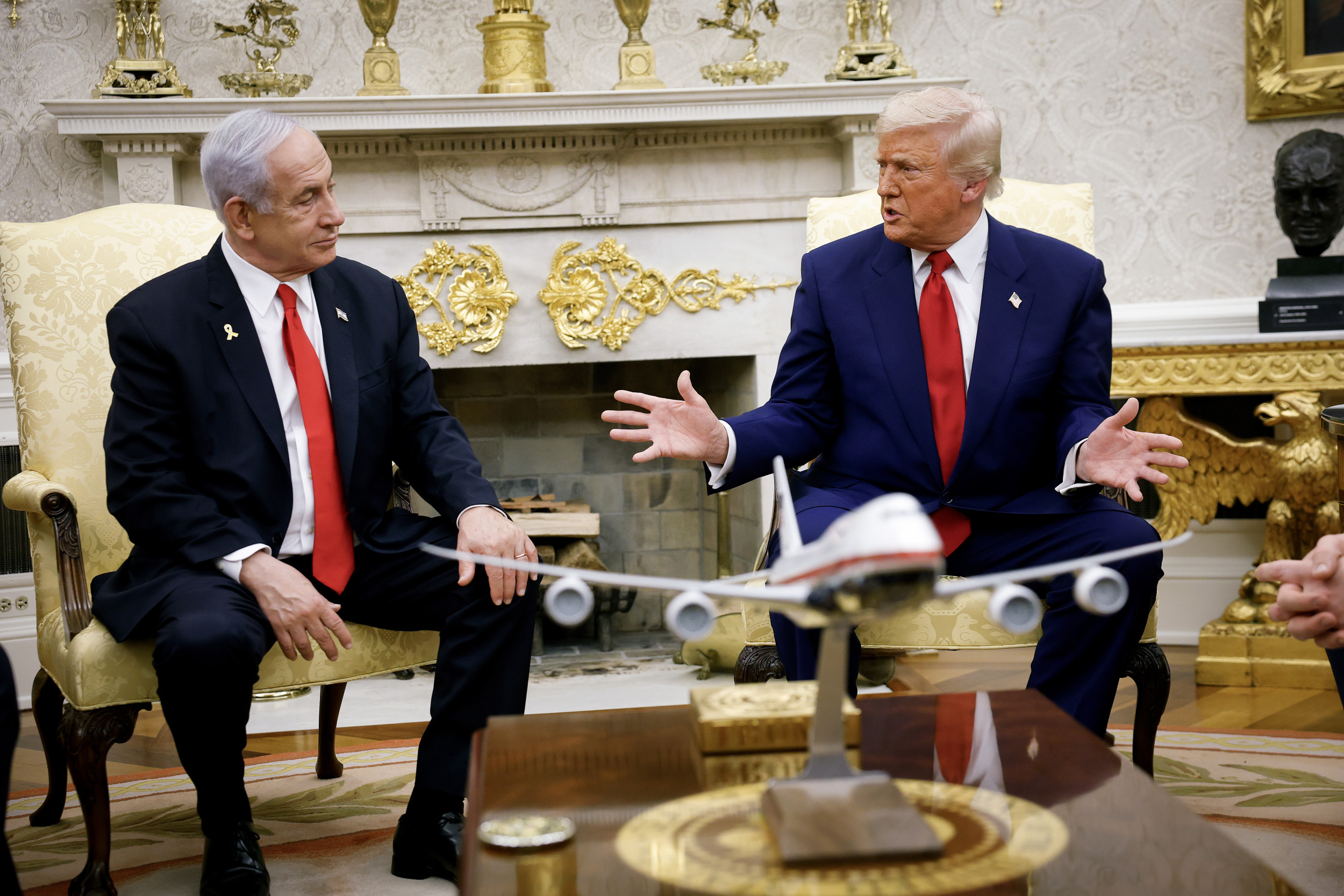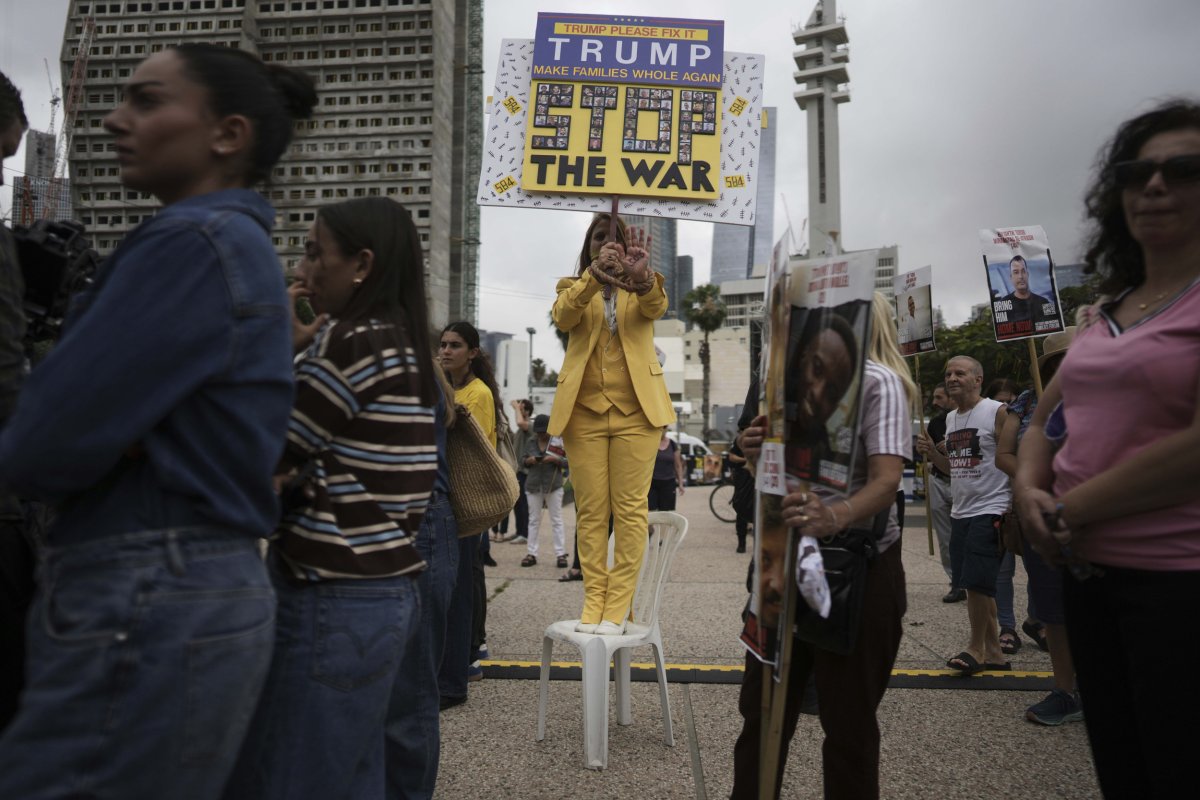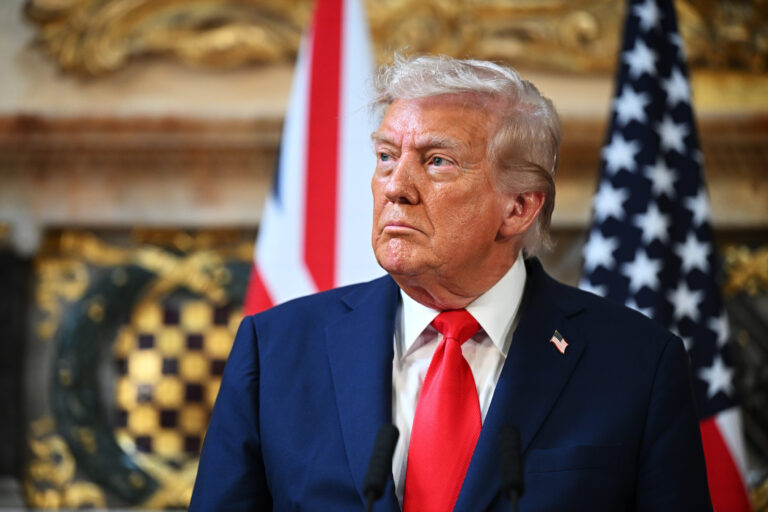
A senior Hamas official tells Newsweek that the Palestinian militant group saw “positive” potential in signs of a growing rift between President Donald Trump and Israeli Prime Minister Benjamin Netanyahu, after offering the U.S. leader a political win in the form of an American hostage release ahead of his Middle East trip.
“Given the unlimited support of the American administration for the entity, any disagreement between them would certainly be a positive development that would weaken Netanyahu’s stubborn position and open the door to the possibility of reaching an agreement to end the war,” Hamas Political Bureau member and spokesperson Basem Naim told Newsweek.
“This is especially true since the continuation of the war does not serve Trump’s strategic projects in the region,” he added, “and Hamas will not accept any agreement that does not lead to an end to the war, ensure the withdrawal of hostile forces and rebuild the Gaza Strip with the participation of its residents.”

Kevin Dietsch/Getty Images
Breaking the Deadlock
The remarks came a day after the release of Edan Alexander, the last known living hostage in Gaza with America citizenship. The release of Alexander, a soldier who is also an Israeli national, was the result of direct talks between senior U.S. officials and Hamas that appeared to sideline Israel at a time when the Trump administration had struggled to revive ceasefire talks.
In a breakthrough widely attributed to the participation of the incoming Trump administration, Israel and Hamas signed a temporary truce in January, going into effect just a day before Trump’s inauguration. Trump hailed the deal as a sign of his commitment to putting an end to the conflicts in the Middle East, only for hostilities to resume in March as the two sides failed to agree on how to proceed to the second phase of the deal.
Naim argued that, from the beginning, Hamas had been prepared to release “all prisoners at once, not just prisoner Edan Alexander.” Some 58 hostages taken by Hamas during the group’s October 7, 2023, attack remain in Gaza.
Such a move, however, would only come “in exchange for a cessation of hostilities and the complete withdrawal of enemy forces,” the Hamas official argued. And that deal would have to “be preceded by the opening of crossings and the entry of humanitarian aid, as this is a guaranteed humanitarian right and not subject to negotiation,” he said.
He blamed Netanyahu for failing to agree to these terms, leading to the unraveling of the temporary truce the two sides reached with support of the incoming Trump administration in January.
The Israeli leader, Naim argued, has only offered “a redeployment of forces, not a withdrawal” and “continues to talk about his goals, which he has failed to achieve over the past 17 months (the complete defeat of Hamas and the return of prisoners through military pressure), adding to this the issue of disarmament and the displacement of the population.”
While rejecting this approach, Naim said Hamas saw an opportunity to engage directly with Trump while Netanyahu was sidelined, offering to release the U.S.-Israeli captive as the president prepared to set out for Saudi Arabia, Qatar and the United Arab Emirates in the first international trip of his presidency.
“The movement did not accept this position outright, but as a result of direct contacts with parties close to the American administration for some time regarding the possibility of a breakthrough in this stuck situation, the movement reaffirmed its previous position to reach a ceasefire,” Naim said.
“It stated that, prior to President Trump’s visit to the region, the movement could initiate a goodwill gesture that would help break the deadlock and secure the release of Israeli-American prisoner Edan Alexander,” he added. This is what happened.”

Oded Balilty/AP
Under Pressure
It was the latest example of Trump moving unilaterally to achieve his foreign policy goals in the Middle East.
Just a week earlier, U.S. officials had negotiated a ceasefire agreement with Yemen’s Ansar Allah, widely known as the Houthi movement, in exchange for Iran-aligned group agreeing to pause attacks on U.S. warships and commercial vessels accused of shipping to Israel amid the war in Gaza. The deal, announced a day after Ansar Allah struck Israel’s Ben Gurion International Airport, notably did not incljde a demand to end to the group’s missile and drone strikes against Israel.
Meanwhile, the Trump administration has also pressed forward on nuclear diplomacy with Israel’s arch-foe, Iran, with the possibility of striking a deal that would allow the Islamic Republic to retain uranium enrichment capabilities for civil purposes, as opposed to a total dismantlement, as Israeli leadership has called for.
Despite the apparent dissonance, officials from both sides have downplayed any indications of a rift between the American and Israeli leaders.
In a statement recently shared with Newsweek, White House National Security Council spokesperson James Hewitt asserted that “Israel has had no better friend in its history than President Trump.”
“We continue to work closely with our ally Israel to ensure remaining hostages in Gaza are freed, Iran never obtains a nuclear weapon, and to strengthen regional security in the Middle East,” Hewitt said. “As he has repeatedly stated in his first and second terms, the President is committed to ensuring Iran never obtains a nuclear weapon.”
Ofir Akunis, Israel’s consul general in New York, echoed that, telling Newsweek “the relationship between the current American administration and the Israeli government, headed by President Trump and Prime Minister Netanyahu, is very close, and it’s very good.”
He acknowledged that “it’s not that we will not find ourselves thinking in different ways about the solutions to all the issues in the Middle East,” but stated that “we’re talking” through such matters.
Akunis also welcomed Alexander’s release as well as what the Israeli diplomat felt was Trump’s strategy of putting Hamas “under pressure.” He said, “That’s the whole idea. If we don’t put them under pressure, then it will not be good.”
This approach, he argued, was the basis for Israel’s decision to conduct strikes new strikes against Gaza shortly after Alexander was freed.
“Less than one hour after Alexander was released, we attacked the Gaza Strip,” Akunis said. “Why? Because we must. We must do it.”

MOIZ SALHI/AFP/Getty Images
He outlined “two main issues” Israel still had to address before putting an end to the conflict, the first being to have “all the hostages released,” and the second that “we must destroy” Hamas.
“We don’t have any other choice,” he said. “We can’t live in a future with Hamas on our borders. It’s impossible. And 70 percent of the tunnels are still there. It’s also an impossible situation.”
Next Steps
Alexander’s release may bolster Trump’s position on his tour through the Gulf this week, a high-stakes trip that notably skips Israel.
Trump, who oversaw the historic Abraham Accords that resulted in the UAE, Bahrain, Sudan and Morocco normalizing ties with Israel during his first administration, has expressed confidence he could extend the accords to include Saudi Arabia. Such a deal, in exchange for ramped U.S. security assistance, was also sought by former President Joe Biden, though Riyadh had proven unwilling to take this step unless Israel was willing to end the war and outline a path to Palestinian statehood.
On Tuesday, the White House announced that Trump and Saudi Crown Prince Mohammed bin Salman had signed a series major strategic partnership agreement, including a $142 billion U.S. arms deal for the kingdom and $600 billion worth of Saudi investment in the U.S., without mention of Israel.
In Tel Aviv, Trump’s Middle East envoy, Steve Witkoff, and hostage envoy, Adam Boehler, met with hostage families on Tuesday. Ahead of the gathering, during which both diplomats pledged to ensure the release of all remaining hostage in Gaza, Boehler told reporters he saw momentum for further agreements following Alexander’s release.

AP Photo/Abdel Kareem Hana
“I think there’s a better chance now than before, I think Hamas knows that they can pull a deal any day that they want, they need to approach Trump, they need to approach Bibi [Netanyahu], and they need to set this up the right way.”
As for Hamas, which had expressed cautious hope over Trump’s election and inaugural commitment to peace, continues to urge the White House to exert pressure on Israel to end the conflict.
“The administration promised to work diligently to end the humanitarian blockade on the Gaza Strip and allow the entry of humanitarian aid, as well as to pressure the Israeli government to reach a ceasefire and end the war,” Naim said.
“The relationship between President Trump and Netanyahu is their business,” he added, “but what matters to us is stopping the aggression against our people and the withdrawal of hostile forces.”




